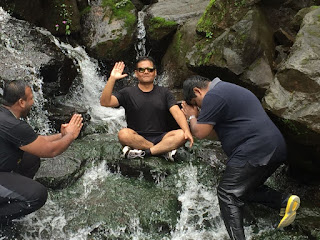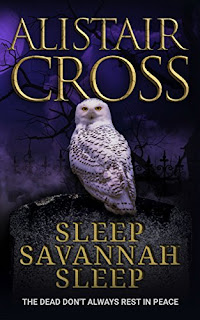Author Interview: Rahul Mitra
Today we have Rahul Mitra, the author of The Boy From Pataliputra, with us for a casual interview. Love the cheeky photograph he sent! So, without further ado, let's get started.
Book Vue: Welcome to Book Vue, Rahul and congratulations on your book. Please tell us a little something about The
Boy From Pataliputra.
Rahul Mitra: Thank you.
The Boy from Pataliputra is the story of Aditya Vikram, a young boy from an aristocratic family of Pataliputra
who is forced to escape from Magadha under dramatic circumstances. It’s basically about his life in exile, his
journey and experiences, the friends he makes and his gradual transformation from a brash, selfish spoilt
brat into a balanced and mature person. At least, that’s the story on the surface.
Underneath this basic narrative, it’s also a powerful story about India and the formation of a nation. You
must remember that the Mauryan empire, which came into being under Chandragupta Maurya and
Chanakya, was the first ‘All India empire’. It was the first time that all of India (or at least a large part of it)
was united under a single political and administrative authority. In some senses, it can be argued that it was
the invasion of the Greeks under Alexander, that set in motion this unifying impulse and that’s what I have
tried to show in this book. So while, on the one hand, it’s a straightforward ‘coming of age’ tale, while on the
other it’s a historical novel based on days and months of painstaking historical research. It’s an attempt to
find the roots of this ‘Idea of India’.
Apart from all of this, it also contains a bit of light-hearted romance, and quite a bit of social and political
commentary. If you read between the lines, you will find that there are references to Indian society and
politics of today as well. It also contains philosophical ideas and my ideas on how one should lead one’s life,
the difference between a man and a boy and the meaning of challenges and pain in life. So in short, it’s a
complicated book that cannot be easily slotted into any one genre.
However, it’s a fairly enjoyable read and you can go through it all and interpret it in any way that strikes your
particular fancy. This is what I have seen in the reviews and the feedback I am getting. It’s clear that
different readers have been affected by different aspects of the book. Some have even ascribed motives
and interpreted it in ways I never thought of.
BV: Does your fascination always steers towards the history of India or do you like to explore?
RM: No, no not at all. I am actually interested in a wide variety of topics. Some of the things that obsess me are
related to India, such as Indian politics, the ‘idea of India’ and our rich culture and heritage. I am also quite
interested in physical culture, cuisine, our modern lives, philosophy and so on.
In fact, though The Boy from Pataliputra is a historical fiction novel, I am very sure you will find glimpses of
all these interests in different parts of the novel.
BV: How much of dedication goes behind the research for such a book and where do you find references?
RM: A lot. As you know, since the last few years, it is mythology that has been ruling the roost in India. So when I
decided to write this book, I was very clear that I wanted this to be a proper historical fiction book rather than
being based on legends/mythology. So I have tried to put in as much real history into this book as possible.
Of course, this is tough, because as you know we in India, have not had a long historical tradition. That is
why, we have such scanty information about personalities like Chanakya and Chandragupta. Even things
like the Battle of the Hydaspes, and Alexander’s invasion of India are only recorded in Greek accounts and
not in Indian accounts. Thankfully, we do have Buddhist and Jaina works from this period, which have
obliquely recorded some of the common legends surrounding Chanakya. We also have the play
Mudrarakshasa and even the Vishnu Purana which mentions Chanakya’s story. How much of this is fictional
and how much real, we do not know, for the different sources carry different versions of the story. However,
we also have the Arthashastra, which gives us a peek into society and life of that time.
For my references, I have mostly referred to two seminal works on Indian history by Romila Thapar. One is
Early India and the other is called Cultural Pasts. Of course, even with all that I had to rely a lot on legendsand the folklore surrounding the Chanakya story. However, even where things are based on legend, I have
also used my own deductions to keep the story as realistic and as far from fantastic as possible.
Just to give you one example- contrary to popular revisionist theories, in my book you will find Chanakya
being a Jain, for this is how it is recorded in the Jain chronicles. It seemed the most logical to me, given the
fact that his closest student and mentee, Chandragupta Maurya retired to the forests as a Jain and fasted to
death in the prescribed manner. It is also likely, given the influence of Jains in the courts of Magadha over
several generations, where they often held important ministerial posts.
BV: Is there a sequel to the book in the making?
RM: Of course there is. Aditya needs to get his revenge, after all and a unified India needs to be formed! So there
are two sequels in the works.
BV: Has writing always been your passion?
RM: Well, let me put it this way- Writing is my work, I was put on this earth to write stuff that others can enjoy. But
it’s not all fun and games, and that’s why I did not use the word Passion. Somehow, I don’t like the ease with
which people throw around this word. There seems to be an implicit assumption that passion means
something that is easy and enjoyable and this is hardly what writing is about.
No, It means working just as hard as anyone doing an office job, and taking twice the stress. I actually have
to sit down to write, and force myself to write even when I have no idea in my head. Then, when I look at it
again later, I realize it’s shit and often have to re-write it again. And this is done over and over again,
everyday, till the written stuff becomes good. On top of that are the uncertainties of whether this will sell,
whether people will like it or in the first place, it will be published at all. So, no, I am not ‘very lucky’ or ‘having
a lot of fun’ because I am, following my passion, rather I am working twice as hard trying to earn as well as
achieve my dream of being a writer. On the other hand, writing being my passion means that I am very clear
that I was put on this earth to contribute to society by writing stories that force people to think.
If you ask me, was I always this clear about my calling, then no, I wasn’t. I always enjoyed reading, and
during college I realized, I was good at writing. I did have vague dreams of being a writer, but I always
struggled against it since it didn’t feel like a practical choice. It is only now, after wasting many years in
corporate life and realizing that it doesn’t satisfy me that I started writing again and this time with a purpose.
BV: Who are some of your favourite authors?
RM: Lot’s of them- I used to be a guy who would read everything, even mail order catalogues, scientific books,
advertisements- anything. It sprang from being naturally curious about everything. The curiosity is still there,
but I don’t have the time anymore so my reading now is quite restricted.
My favourite authors are Ernest Hemingway, Saadat Hasan Manto, William Saroyan, John Irving, George
Orwell, Alexandre Dumas, Sarat Chandra Chattopadhyay, Bibhuti bhushan Bandopadhyay, Satyajit Ray,
Robert Luis Stevenson, George RR Martin, Salman Rushdie, Ryszard Kapuscinski, Ismat Chughtai, L.Frank Baum, Harishankar Parsai, Mark Twain, Charles Dickens and many more.
I also really love autobiographies.
BV: When are you planning on your next book?
RM: I hope it’ll be published by the end of next year.
Thank you so much for your time, Rahul. Looking forward to the next book and wishing you all the very best for the future.
If you haven't read The Boy From Pataliputra yet, don't wait. You can read my review of the book here.



Comments
Post a Comment